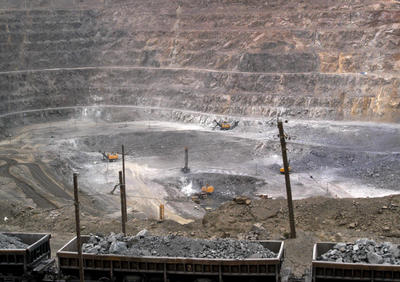, which are currently subject to similarly restrictive laws.
China accounts for over 90 per cent of rare earth production and has dominated the market since the 1990s. However, citing environmental damage, China has instituted annual quotas since 2009 to cap the availability of these resources outside the country. The extraction of REEs, which are used in everything from smartphones to green-energy infrastructure, frequently requires the use of caustic products and processes that can compromise the ecological health of surrounding areas. Yet even as Beijing cited environmental concerns to restrict exports, Chinese domestic production continued unabated.
The co-complainants contended that, contrary to WTO rules, Beijing’s decision unfairly leveraged its near-monopoly on the elements, reducing international supply to the point where foreign companies were forced to establish factories in China to tap into the artificially cheaper domestic market and compete with Chinese companies that also depend on the elements. The WTO ruling largely concurred with these claims, noting that ‘China imposes three distinct types of restrictions on the export of rare earths … duties (taxes) … export quota[s] … and certain limitations on the enterprises permitted to export the materials’, all in contravention of their obligations as a WTO member.
In a statement commending the verdict, US Trade Representative Mike Froman asserted that ‘China’s decision to promote its own industry and discriminate against US companies has caused US manufacturers to pay as much as three times more than what their Chinese competitors pay for the exact same rare earths. WTO rules prohibit this kind of discriminatory export restraint and this win today, along with our win 2 years ago in an earlier case, demonstrates that clearly’. But by these same standards, the current US legal and regulatory infrastructure associated with liquefied natural gas and crude oil exports constitute a similar kind of discriminatory restriction.
The US Natural Gas Act of 1938 fast-tracks LNG exports to FTA partner countries, while requiring a Department of Energy exemption for non-FTA countries. Given that only five nations have both an FTA with the United States and the LNG terminal infrastructure required to receive imports, direct international access to this supply is clearly restricted. In addition, although 31 US companies have sought exemptions from the Department of Energy to export LNG to non-FTA countries, only seven such waivers have been granted as of March 2014. Moreover, the Energy Policy and Conservation Act of 1975 prohibits nearly all exports of US crude oil production, though it does allow for limited exceptions at the discretion of the executive branch.
This situation, which closely resembles the conditions that prompted US litigation against China at the WTO in both 2011 and 2014, contradicts the US promotion of free trade. The US is essentially condemning Chinese export licensing restrictions on certain raw materials while simultaneously utilizing a similarly onerous licensing structure that, in practice, restricts US energy exports.
In particular, the Department of Energy evaluates export applications to non-FTA countries based on vague ‘public interest’ or ‘national interest’ criteria that have resulted in long delays. Under GATT Article XI and related judicial precedent, WTO-members generally cannot restrict imports and exports, including export restrictions that stem from delays brought on by ‘discretionary’ licensing systems like those of the DOE. Taken together, these existing obligations coupled with the recent rare-earths ruling indicate that a legal challenge to the current licensing structure for LNG exports would likely find US policy inconsistent with its WTO commitments.
The two WTO exemptions that the United States could cite in defence of its restrictions — those being conservation of exhaustible natural resources and protection of human health — are both manifestly at odds with continued (and increasing) domestic production and consumption.
Regardless of whether or not the United States faces a WTO challenge in the near term, the implications of the recent WTO ruling for energy hungry countries in the Asia Pacific cannot be understated. Many of these nations would still receive preferential access to LNG exports given their participation in the Trans-Pacific Partnership (TPP). However, the WTO ruling signals to TPP and non-TPP countries alike that current US laws governing LNG exports are likely to change in the coming years to allow access to US energy resources.
In anticipation of this shift, some countries have already started investing in prospective LNG export projects around the United States. Japan, the world’s largest LNG importer, stands to benefit enormously from access to the US market. To that end, Japanese companies have signed contracts with two of the seven companies that have secured non-FTA export rights, and are in negotiations with another two that have similar applications pending with the Department of Energy. South Korea, the world’s number-two importer of natural gas, has also signed on to several projects, as have Indian and Chinese companies.
Assuming that the WTO ruling against China survives an expected appeal, this precedent ensures that US laws pertaining to LNG and oil exports will either change voluntarily or through legal compliance with trade obligations in the coming years, ushering in a new supply of cheap and abundant energy for Asian consumers.
John VerWey is a Program Manager at the American Enterprise Institute.


This is a smart post. In retrospect it certainly looks like the USTR might have resisted manufacturing industry calls to participate in the WTO challenges. That said the author’s confidence that the Panel ruling will be upheld by the AB just goes to show that even if the US had not litigated these cases WTO law would still frown on export restrictions for oil. Also, the devil truly is in the details and any future litigation will turn on details of US export policy not explored here. The US allows oil exports to FTA partners, for instance.